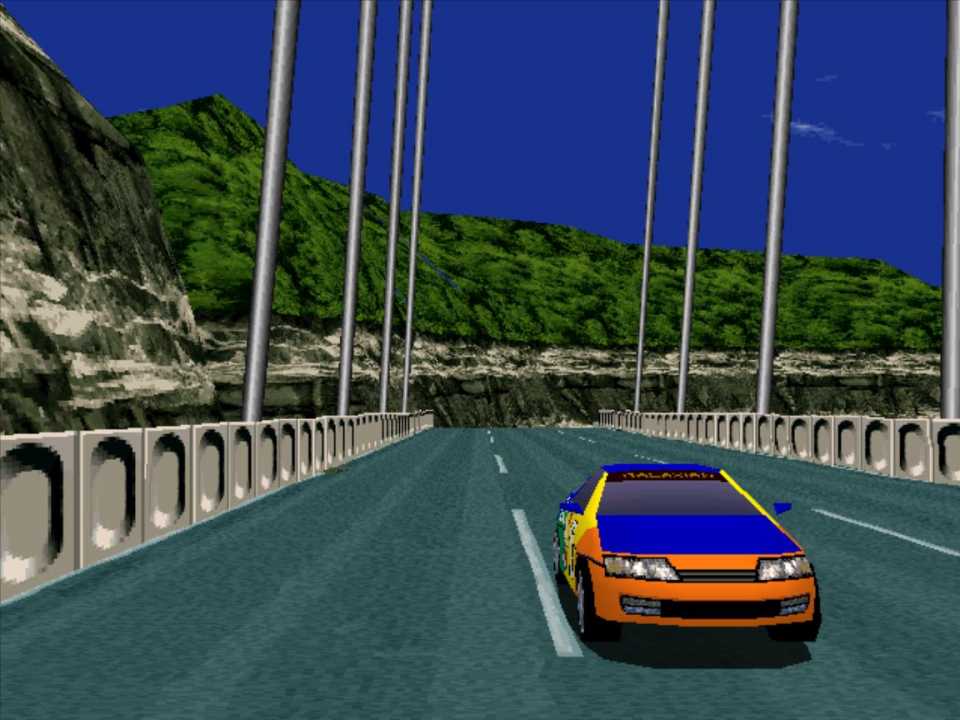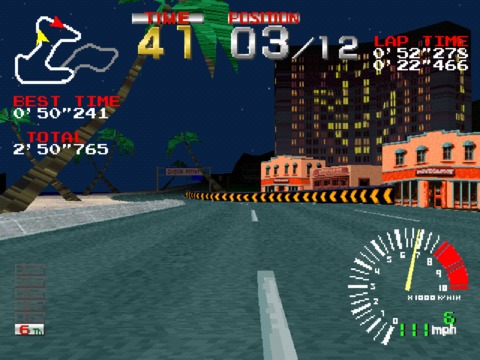Ridge Ranker: #6
By PistonHyundai 1 Comments
[This is the fifth entry in a countdown of the best Ridge Racer games. I recommend you read the introduction before reading this; it includes a brief history of the series and links for each entry.]
Ridge Racer - Arcade/Sony PlayStation/Sony PlayStation 2/Mobile/Zeebo, 1993

The Arcade Comes Home
It's funny to think about it, but even after over a decade of iteration, the original Ridge Racer holds up. I've been through the game's course, Seaside Route 765 (and its expert-mode variant, Ridge City Highway), more times and in more games than I can count, but I still find myself coming back to its original incarnation more often than I should. There's no question that later entries would have more to offer, sport sharper graphics, and mostly play better, but there's just something to the original's arcade sensibilities that helps it retain its appeal as a quick fix of adrenaline. Maybe Kaz Hirai was onto something and those jerks in the audience should've been hooting and hollering and jumping out of their seats when he revealed that the experience was coming to their portable console, since it's a perfect pick-up-and-play game.
Some of this lasting appeal is owed to the game's presentation. Later games in the series keep the ridiculous "drive sideways" approach to gameplay and the endearing re-imagining of various Namco franchises and characters as in-game racing brands, but few have that unmistakeably-90s arcade racing vibe of saturated colors and cheesy commentary encouraging you to do your best. There's an energy and enthusiasm that the game has for itself and its players that's not only charming, but makes everything about it a little more exciting. Hell, something as mundane as setting things up in the menu manages to get me pumped to play the game, thanks to the echoing pep talk from knockoff Fred Schneider. In an age of backwards-baseball-hat-ass attitude and Dan Cortese trying his hardest to make the lamest shit seem x-treme, it's refreshing to see something so... genuine. And even with visuals that nobody would ever mistake for something resembling real life, I can't help but gawk at passing helicopters or roadside ads for other Namco games.

By series standards, the game's soundtrack is pretty spartan, but the 6 tracks composed by the SamplingMasters holy trinity of AYA, MEGA, and sanodg do a great job regardless. Outside of the game's title track (which ironically sounds like standard video game fare as far as instrumentation goes), the music establishes the series' EDM identity with a roster of consistent, driving techno beats. High points include the sample-driven intensity of Speedster and the first of sanodg's Rare Hero tracks, where he takes an earworm of a melody and a handful of samples ("let it hit 'em") and transforms them across five different Ridge Racer games, but there isn't a bad track in the bunch. Even the batshit gibberish of Rotterdam Nation begins to grow on you after a while.
The driving is rock solid, but varies depending on which version you play. The arcade version benefits greatly from having analog controls, and everything handles like butter. If anything, it almost feels a little too smooth. There's isn't really any "give" as you steer back and forth, giving the impression that you're rotating the entire vehicle at once instead of adjusting the angle of the wheels. The PlayStation version feels more natural, and while the lack of analog control is felt (at least, for those of us without a NeGcon), it's compensated for with a choice in vehicle, with each car having different handling, traction, acceleration, and max speeds. The arcade version feels better overall, but there's more depth to the PlayStation port thanks to the "new" cars.
Now, what really hooks me in with Ridge Racer is its difficulty. Where games like Rage Racer and R4 have room for error, letting players progress with just a podium finish, this game wants you to win your god damn race. Like a lot of arcade racers, there's a huge focus on getting that perfect run (especially considering the savage AI and the speed hit you take with any collisions), which means you become intimately familiar with both your vehicle and the racetrack. As you work your way through the game's four races (and four reverse races on PlayStation), you start to pick up on what turns to drift through, when to start those drifts, and which cars can take certain turns without drifting at all. The arc of going from bumping into walls as you try to turn corners to whipping out reverse 360-degree drifts around the track's sharpest corner as the announcer calls you a genius is one of the more gratifying things in the series, and even though the game eventually goes overboard in its endgame Time Trial showdown with the fabled 13th Racing "Devil Car" (where a lack of a rear view mirror often kills your chances of staying ahead), making it to that point is still a damn good time.
Ridge City Port Authority
Now here's the hard part: there are no less than seven different versions of Ridge Racer to take account of, so which one takes the honors? There's the original arcade release, its Ridge Racer 2 revision, the original PlayStation port, the enhanced "Turbo Mode" remaster that came with R4, the PS2 port that came with the Japan-only namCollection anthology, a version for mid-2000s mobile phones, and even a port to the Zeebo. The mobile and Zeebo versions are pretty clearly not contenders, but let's take a look at the others.
The arcade versions run at a locked 60 frames per second and in an impressive (for 1993) 640x480 resolution, but lack any unlockables or the ability to race the course in reverse. Ridge Racer 2 has a rear view mirror for blocking opponents behind you, multiplayer link-up functionality, and a superior soundtrack with 11 songs (all of which are absent in the PlayStation versions). It also lets you pick from eight cars in the service menu, but without unique statistics or even a third-person view, it's a little pointless.
The PlayStation port runs at half the resolution and framerate of the arcade versions, but has a slew of vehicles with unique characteristics, an optional third-person camera, reverse variations of each course, and a boss car to race and unlock. This is also the version you saw Kaz playing on his PSP.
The 2005 namCollection version is based on the PlayStation port and ostensibly has analog stick support, but it's an import-only title that doesn't run in emulators, so I couldn't tell you myself. What I can tell you is that it features a rearranged soundtrack that attempts to recreate the samples used, and it makes the whole thing sound like a street corner bootleg. Just take a quick listen to Speedster: it's like they got the "OH NO" sample from Mr. Bill or something.
While experimenting in an attempt to get R4 to run at 60 frames per second on PlayStation hardware, the team at Namco managed to get the original running at 480i and 60 frames per second, and released this as a bonus disc alongside R4 under the name Ridge Racer Turbo Mode. Unfortunately, the day-to-night cycle and traditional 13 car races are absent in this version, leaving you with up to only 2 other vehicles to race against. This isn't necessarily a deal breaker, but the soundtrack is: with the rest of the disc dedicated to FMV trailers and demos for other Namco games, there's only room for two songs during gameplay: Ridge Racer and Grip from Ridge Racer 2/Revolution. At least the Angel Car from Revolution makes an appearance as a boss.
This leaves us with no real definitive version 25 years after the fact. Personally, the features of the PlayStation ports win me over, but the barren soundtrack and races of Turbo Mode lead me to the 1994 original despite its weaker performance. You really can't go wrong with any of these versions, though.
In spite of decades of innovation and improvements, there's still something to be said about OG Ridge Racer. There's no shortage of better racing games (or even better Ridge Racers), but with the unbridled pep of its aesthetic and the allure of a well-earned first place finish, I can't resist busting the PSP out every once in a while.
[Key Tracks: Rare Hero, Feeling Over, Speedster]
